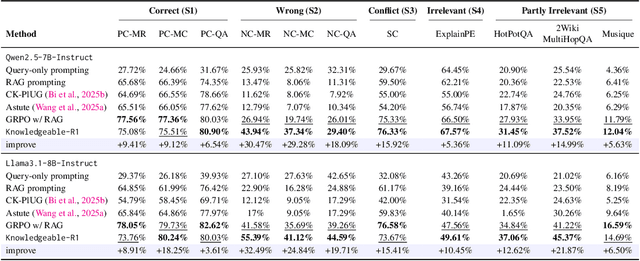Chenfu Bao
Safety-Utility Conflicts Are Not Global: Surgical Alignment via Head-Level Diagnosis
Jan 07, 2026Abstract:Safety alignment in Large Language Models (LLMs) inherently presents a multi-objective optimization conflict, often accompanied by an unintended degradation of general capabilities. Existing mitigation strategies typically rely on global gradient geometry to resolve these conflicts, yet they overlook Modular Heterogeneity within Transformers, specifically that the functional sensitivity and degree of conflict vary substantially across different attention heads. Such global approaches impose uniform update rules across all parameters, often resulting in suboptimal trade-offs by indiscriminately updating utility sensitive heads that exhibit intense gradient conflicts. To address this limitation, we propose Conflict-Aware Sparse Tuning (CAST), a framework that integrates head-level diagnosis with sparse fine-tuning. CAST first constructs a pre-alignment conflict map by synthesizing Optimization Conflict and Functional Sensitivity, which then guides the selective update of parameters. Experiments reveal that alignment conflicts in LLMs are not uniformly distributed. We find that the drop in general capabilities mainly comes from updating a small group of ``high-conflict'' heads. By simply skipping these heads during training, we significantly reduce this loss without compromising safety, offering an interpretable and parameter-efficient approach to improving the safety-utility trade-off.
Token-Level Policy Optimization: Linking Group-Level Rewards to Token-Level Aggregation via Markov Likelihood
Oct 10, 2025



Abstract:Group Relative Policy Optimization (GRPO) has significantly advanced the reasoning ability of large language models (LLMs), particularly by boosting their mathematical performance. However, GRPO and related entropy-regularization methods still face challenges rooted in the sparse token rewards inherent to chain-of-thought (CoT). Current approaches often rely on undifferentiated token-level entropy adjustments, which frequently lead to entropy collapse or model collapse. In this work, we propose TEPO, a novel token-level framework that incorporates Markov Likelihood (sequence likelihood) links group-level rewards with tokens via token-level aggregation. Experiments show that TEPO consistently outperforms existing baselines across key metrics (including @k and accuracy). It not only sets a new state of the art on mathematical reasoning tasks but also significantly enhances training stability.
HAMLET-FFD: Hierarchical Adaptive Multi-modal Learning Embeddings Transformation for Face Forgery Detection
Jul 28, 2025Abstract:The rapid evolution of face manipulation techniques poses a critical challenge for face forgery detection: cross-domain generalization. Conventional methods, which rely on simple classification objectives, often fail to learn domain-invariant representations. We propose HAMLET-FFD, a cognitively inspired Hierarchical Adaptive Multi-modal Learning framework that tackles this challenge via bidirectional cross-modal reasoning. Building on contrastive vision-language models such as CLIP, HAMLET-FFD introduces a knowledge refinement loop that iteratively assesses authenticity by integrating visual evidence with conceptual cues, emulating expert forensic analysis. A key innovation is a bidirectional fusion mechanism in which textual authenticity embeddings guide the aggregation of hierarchical visual features, while modulated visual features refine text embeddings to generate image-adaptive prompts. This closed-loop process progressively aligns visual observations with semantic priors to enhance authenticity assessment. By design, HAMLET-FFD freezes all pretrained parameters, serving as an external plugin that preserves CLIP's original capabilities. Extensive experiments demonstrate its superior generalization to unseen manipulations across multiple benchmarks, and visual analyses reveal a division of labor among embeddings, with distinct representations specializing in fine-grained artifact recognition.
Knowledgeable-r1: Policy Optimization for Knowledge Exploration in Retrieval-Augmented Generation
Jun 05, 2025



Abstract:Retrieval-augmented generation (RAG) is a mainstream method for improving performance on knowledge-intensive tasks. However,current RAG systems often place too much emphasis on retrieved contexts. This can lead to reliance on inaccurate sources and overlook the model's inherent knowledge, especially when dealing with misleading or excessive information. To resolve this imbalance, we propose Knowledgeable-r1 that using joint sampling and define multi policy distributions in knowledge capability exploration to stimulate large language models'self-integrated utilization of parametric and contextual knowledge. Experiments show that Knowledgeable-r1 significantly enhances robustness and reasoning accuracy in both parameters and contextual conflict tasks and general RAG tasks, especially outperforming baselines by 17.07% in counterfactual scenarios and demonstrating consistent gains across RAG tasks. Our code are available at https://github.com/lcy80366872/ knowledgeable-r1.
A Framework for Cost-Effective and Self-Adaptive LLM Shaking and Recovery Mechanism
Mar 12, 2024



Abstract:As Large Language Models (LLMs) gain great success in real-world applications, an increasing number of users are seeking to develop and deploy their customized LLMs through cloud services. Nonetheless, in some specific domains, there are still concerns regarding cost and trade-offs between privacy issues and accuracy. In this study, we introduce a cost-effective and self-adaptive LLM shaking tuning and recovery mechanism, named CypherTalk. With carefully designed horizontal and vertical shaking operators, we can achieve comparable accuracy results with SOTA privacy-preserving LLM schemes using Cryptography-based or Differential Privacy-based methods. Experiments also show that with the CypherTalk framework, users can achieve reliable accuracy when using optimized shaking operator settings. To our best knowledge, this is the first work that considers cost, and trade-off between model utility and privacy in LLM scenarios.
 Add to Chrome
Add to Chrome Add to Firefox
Add to Firefox Add to Edge
Add to Edge